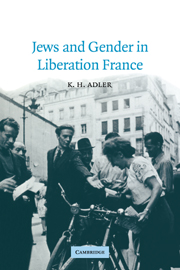Book contents
- Frontmatter
- Contents
- List of illustrations
- Abbreviations
- Acknowledgements
- 1 Introduction: the long liberation
- 2 Narrating liberation
- 3 Anticipating liberation: the gendered nation in print
- 4 Limiting liberation: ‘the French for France’
- 5 Controlling liberation: Georges Mauco and a population fit for France
- 6 Liberation in place: Jewish women in the city
- 7 Conclusion
- Notes
- Bibliography
- Index
- Studies in the Social and Cultural History of Modern Warfare
4 - Limiting liberation: ‘the French for France’
Published online by Cambridge University Press: 04 July 2009
- Frontmatter
- Contents
- List of illustrations
- Abbreviations
- Acknowledgements
- 1 Introduction: the long liberation
- 2 Narrating liberation
- 3 Anticipating liberation: the gendered nation in print
- 4 Limiting liberation: ‘the French for France’
- 5 Controlling liberation: Georges Mauco and a population fit for France
- 6 Liberation in place: Jewish women in the city
- 7 Conclusion
- Notes
- Bibliography
- Index
- Studies in the Social and Cultural History of Modern Warfare
Summary
‘France for the French’, Charles Maurras and his followers in the extreme right Action Française insisted and, between 1940 and 1944, exclusion of all that was deemed foreign in terms of gender role, ethnicity and nationality had been Vichy's driving force. In 1946, Robert Debré, a respected paediatrician, and Alfred Sauvy, the demographer and econometrist, both advisers to Charles de Gaulle, published a book in which they outlined their populationist vision for the post-war development of France. Here, they inverted the Maurrassian slogan, demanding not France for the French, but French people for France, ‘des Français pour la France’. Neither Debré nor Sauvy had much time for Maurras (Debré had been a clandestine resister, and Sauvy claimed to have been). But of what did these ‘French’ consist whom the authors suggested should repopulate the diminished nation and restore its former greatness?
The provisional government based in Algiers issued the clarion call for population policies to take centre stage after the war. ‘In post-war politics, there can be no doubt that the first concern, the only consideration to which all others must be subordinated, must be the reconstitution of the population in France’, wrote one of its members who had designs on a ministerial post. Liberation was the demographers' moment. Amid all the conflict and discord already present in the resistance, despite its unity of opposition to the occupation, there persisted one field of stark agreement: France was underpopulated.
- Type
- Chapter
- Information
- Jews and Gender in Liberation France , pp. 68 - 105Publisher: Cambridge University PressPrint publication year: 2003



